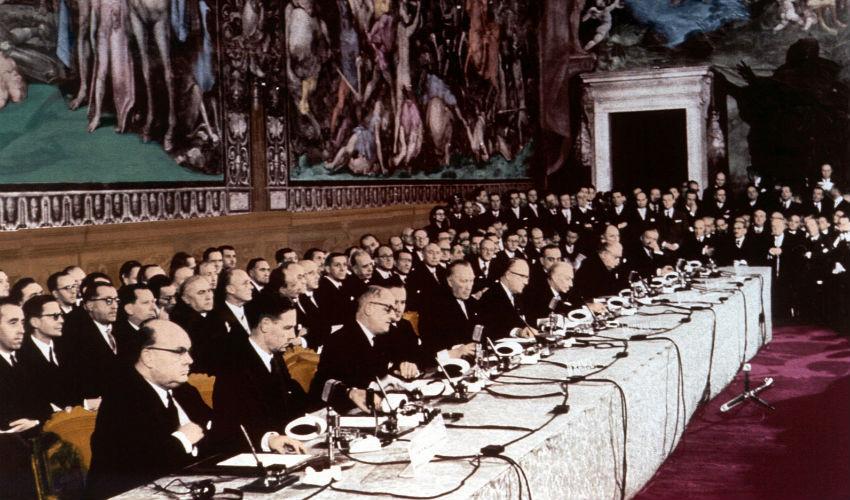
Why We Have to Celebrate
THE WORLD IN 1957 WHEN, ON 25 MARCH, THE TREATY OF ROME WAS SIGNED AND THE EUROPEAN ECONOMIC COMMUNITY WAS BORNby Andrea Colli, Full Professor of Economic History
That year, 1957, was not an easy year. It came in the middle of a striking acceleration in the pace of the Cold War. In 1955, the Soviets had finally created their own military alliance, a sort of “Red Nato”, the Warsaw Pact. The alliance was, if needed, another brick in the wall of the Iron Curtain – and was a clear act of hostility which further increased an already high level of tension. 1956 had opened with some good news, that is the beginning of the de-stalinization process, with the famous speech in which Nikita Krushev condemned Stalin’s “cult of personality”. The same year, a Conference in Bandung (Indonesia) had basically originated the non-aligned movement of countries, mostly former colonies, which were refusing both the old, and the new, forms of unequal domination.
The escalation, however, had started in the African hot summer, when Nasser, the Egyptian President, nationalized the Suez Canal – de facto opening an international crisis which opposed Egypt to Israel, France and Britain (respectively the neighbour, the owner and the main user of the canal itself). The Suez crisis was a sort of symbolic event, because its solution – due basically to the US’ persuasive pressure on the three allies in order to avoid a Russian involvement in the conflict – was both the end of the old colonial geopolitical order and the evidence of a new hierarchy of diplomatic and military “super-powers”. The autumn’s cold winter had witnessed the sad Hungarian uprising, crushed in blood by the Soviet tanks.
In the meantime, missiles were deployed almost everywhere. The Soviets were about to win the first manche in the space race, with the Sputnik, launched in September, 1957. The threat of a final war was more and more concrete, with the US starting in October of the same year a nuclear alert, 24 hours per day, seven days per week, which would last about 35 years, up to 1991. In Cuba there was guerrilla warfare, and Castro and Che Guevara would defeat the US-backed dictator, Batista. There was guerrilla warfare in Africa. Civilians were killed, on both sides, both young boys and girls, those dancing in Algiers’ Cafés, those tortured by the French paratroopers.
Squeezed in the middle of these atrocities – among which the daily threat of the extinction of the human race on Earth was probably the worse, even if the less “visible” – was Rome’s mild March, when the Treaty was signed which gave birth to the European Economic Community, a giant step towards the birth of the European Union. Italy, France, the Netherlands, Belgium, tiny Luxembourg and West Germany were signing, however, much more than a trade agreement – which was, in any case, an essential move towards the recreation of the World global order. They were betting on the future. This “bet” was based on the idea that a divided Europe had been brutalized by a horrible, never-ending Civil War which had lasted from 1914 to 1945. A bet based on the idea of European unity as the unique way to a rebirth, which had become evident since the beginning of the European Recovery Program, or Marshall Plan, as Europeans nicknamed it. In March 1946, when Europe was still under the dusty rubble of the bombings, Winston Churchill prophetically stated: “The safety of the world requires a unity in Europe, from which no nation should be permanently outcast”. Unity meant strength, and strength meant, for Europe, to be great once again, in a World under permanent threats.
That’s why we have to celebrate.
